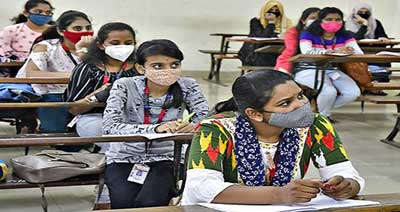Date: 19/01/2023
Relevance: GS-3: Science and Technology- developments and their applications and effects in everyday life.
Key Phrases: Artificial Intelligence, Machine Learning, Big Data, Digital Pedagogies, Innovative Teaching, Learning Processes, Modernisation, Professionalisation, Higher Education
Context:
- The government and the University Grants Commission have decided to allow foreign universities to set up campuses in India.
Key Highlights:
- The initiative aims to not only give students access to high-quality global education but also to foster healthy competition among institutions.
- In this context, professionalisation of the functioning of HEIs has become a top priority for Indian universities.
Challenges Faced By Indian Higher Education:
- Challenges faced by Indian higher education include:
- Coping with demographic structures
- Poor performance,
- Adherence to traditional systems,
- Digital divide, and struggles in scaling up.
- Over-centralisation and a lack of accountability and professionalism are the other issues faced by HEIs.
- The burden of academic and administrative responsibilities has also significantly increased, diluting the core agenda of higher education, i.e., imparting knowledge, quality teaching and research.
- The lack of domain expertise in academic administrators in improving governance structures has also hindered the progress of education reforms.
Need for Prioritising Reforms:
- A primary reason management reforms are not prioritised in India is that university leadership and academic administrators may not have the domain expertise to improve the internal governance structures, processes, and managerial approaches.
- The uncertainty over higher education funding, ever-increasing student enrolment, global competition, the continuation of conventional systems, prioritising digitisation and the continuing marketisation of higher education signal the need for complete modernisation and professionalisation of higher education institutions systems.
Do You Know?
What is Education 5.0?
- Education 5.0 is a concept that emphasizes the use of technology to personalize learning and create a more collaborative and holistic approach to education.
- It is an evolution of the traditional education system, which focuses on the use of technology to enhance the teaching and learning experience.
- Education 5.0 is based on the idea that education should be learner-centric, meaning that it should be tailored to the individual needs and preferences of each student.
- This can be achieved through the use of technology such as artificial intelligence, virtual reality, and big data analytics to personalize the learning experience.
- Additionally, Education 5.0 promotes a more collaborative and holistic approach to education, where students are encouraged to work together to solve real-world problems and develop critical thinking skills.
What is Industry 5.0?
- Industry 5.0, also known as the "Smart Industry" or "Industry 4.0+" is a concept that refers to the integration of advanced technologies such as artificial intelligence, the Internet of Things, and big data analytics into the manufacturing process, with the goal of increasing efficiency, productivity, and flexibility.
- It also aims to increase the level of human-machine collaboration, and the use of digital twin technology, which allows the virtual representation of physical assets, processes, and systems.
- Industry 5.0 is considered the next step of Industry 4.0, which focused on the integration of cyber-physical systems, the Internet of Things, and the cloud into the manufacturing process.
- Industry 5.0 goes one step further by integrating advanced technologies such as artificial intelligence and quantum computing, to enable more sophisticated automation and decision-making.
What Needs To Be Done?
- Senior academic administrators need to start collaborating to professionalise institutions.
- Institutions must continue to evolve, innovate and adapt to dynamic external conditions. However, the rise of managerialism and the erosion of academic autonomy could pose challenges.
- Studies have established that it is crucial to follow strategic Human Resource Management (HRM) practices in higher education institutions to establish gender diversity and maintain a balanced representation of women, particularly in leadership and other academic and administrative position.
- Diversifying the sources of funding is crucial for modern academic institutions.
- Higher education leaders must ensure employees’ overall development and interpersonal skills, such as creative and critical thinking.
- In the time of the advancement of automation and synergies between Education 5.0 and Industry 5.0, it is essential to innovate and digitise.
- Use of artificial intelligence, machine learning, Big Data, and other digital pedagogies towards innovative teaching-learning processes and other functions of higher education are also crucial.
Conclusion:
- HEIs must recruit quality faculty and experts for academic support functions such as human resource management, financial management, communication, web design, knowledge management, business development, academic research, international student management, Enterprise Resource Planning (ERP), electronic dissemination, marketing and print publications.
- Providing world class infrastructure and lab facilities will also help in brand building, accreditation and ranking.
- The National Education Policy 2020 has also highlighted the importance of modernisation hence it is necessary to take steps in this direction without any delay.
Source: Business Line
Mains Question:
Q. Use of artificial intelligence, machine learning, Big Data, and other digital pedagogies towards innovative teaching-learning processes are crucial for the modernisation and professionalisation of higher education institutions systems. Comment (150 words).






















